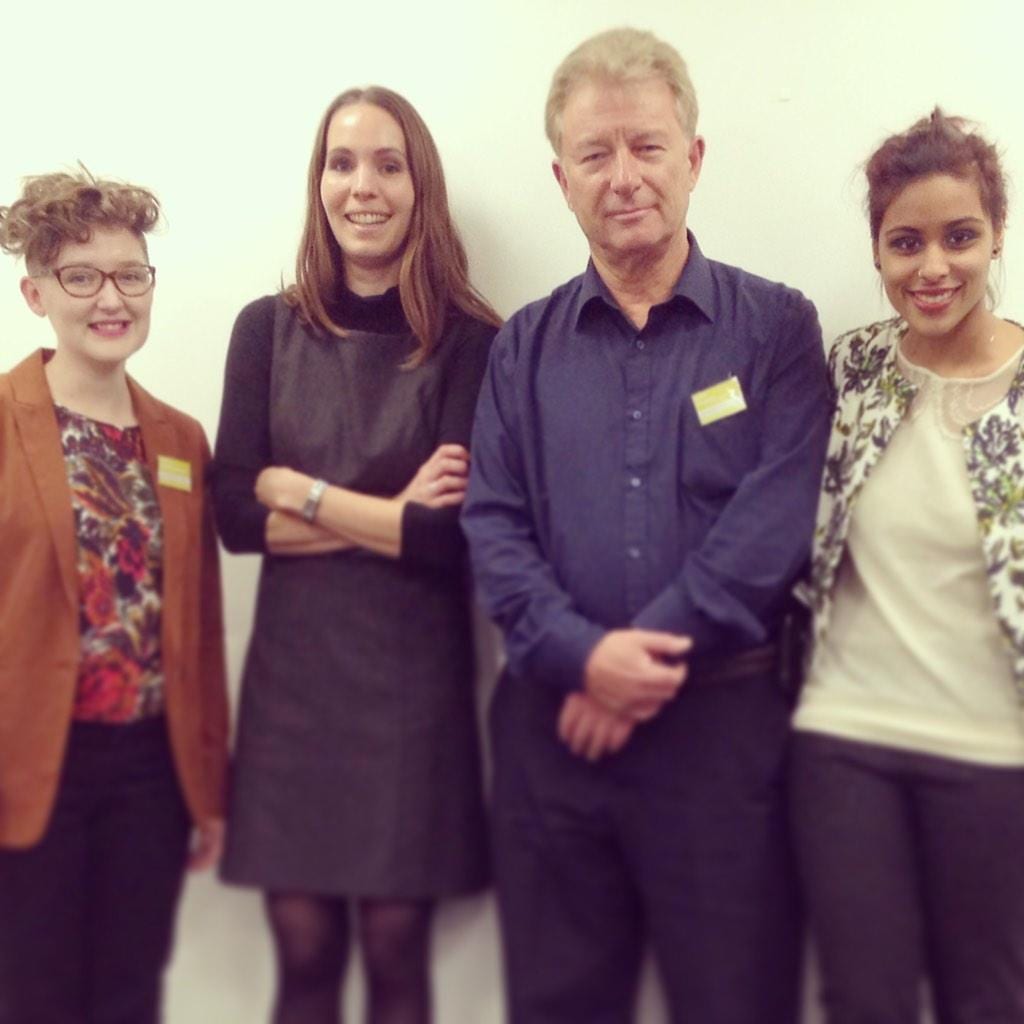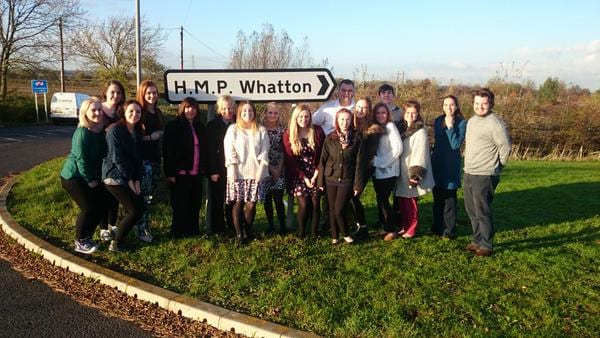
by rbartels | Dec 9, 2014 | Forensic
On November 20th, 2014, onlinePROTECT hosted a full-day workshop entitled “Internet-based Sex Offending: Case Formulation and Intervention Planning” at Hamilton House, London. onlinePROTECT is an international research collaboration led by Dr Hannah Merdian (University of Lincoln; FCRG) and Prof Derek Perkins (Surrey University & West London Mental Health NHS Trust). onlinePROTECT address the safety of children and young people in online and offline environments, by targeting the offenders who engage in online sex offences against minors, specifically those who view and produce Child Sexual Exploitation Material (CSEM).
The workshop was a great success and PhD student and FCRG member – Danielle Kettleborough – has provided an overview of the day, which can be viewed here

by rbartels | Dec 9, 2014 | Forensic
On the 5th November this year, the FCRG organised a trip for 3rd year undergraduate students (who study ‘Psychology with Forensic Psychology’) to visit HMP Whatton. This was followed by a trip with the MSc Forensic Psychology students on the 17th November.
On both days, the Whatton staff gave up their time to talk to the students about what they do at Whatton in terms of treatment for sex offenders. In addition, two inmates kindly provided time to talk to the students, giving first-hand insights into the benefits of the programmes they had completed. One of the 3rd year students (Ryan Hesp) has written a piece about the trip, which nicely sums up the day. See below
Her Majesty’s Prison (HMP) Whatton Undergraduate Visit by Ryan Hesp
HMP Whatton is a Category C prison which holds adults male sex offenders, and one of the largest treatment-focused prison establishments for sex offenders in Europe. Whatton provides a series of learning and skills-based activities, including education, vocational training, industrial workshops and manufacturing, and gardening. There are also a large range of treatment programmes targeting offending and offence-related behaviours, including SOTP (Sex Offender Treatment Programme), the Enhanced Thinking Skills training, and CALM (Controlling Anger and Learning to Manage it). The prison also runs a Listener Scheme, providing a peer-support system for those who wish to talk to someone and/or are considered to be at risk of suicide or self-harm.
The aims of our undergraduate trip was to: 1) get a feel for a prison setting, as a potential future employment setting. 2) Learn about some of the treatment programmes provided within a prison environment, and the challenges of delivering it. We can honestly say what an informative visit it was!
As we arrived, we realised the level of security; much to our amusement, our school representative was not allowed to enter the premises as he forgot his ID. Once all security procedures were in place, we began our journey into the prison. We were escorted to the Visitors’ Centre where we met a number of staff responsible for the treatment and rehabilitation of the prisoners. After introductions and some background information, we were able to ask questions, on prison and prison life.
We were then familiarized with some of the many treatment programmes and rehabilitation schemes within HMP Whatton. We were given informative visitor booklets for our notes and able to ask questions relating to the programme content. The staff provided a wealth of information, from both personal experience and about current literature; it was a great experience for us psychology students to see the real-life application of psychological knowledge in an applied setting.
Three prisoners that are part of peer mentor scheme then came and spoke to us, giving us another angle on the treatment programmes, from a prisoner’s point of view. Their personal accounts reinforced the applicability and usefulness of the treatment programmes for individual change and growth. Again, we were able to ask many, sometimes difficult questions, about life in prison. Once we got all our questions and comments out of the way, we were itching to begin the prison tour; we were lucky to see the group treatment rooms, the prisoners-run textile factory and one of the inmates’ wings, as well as sneak peeks of inmate cells, dining rooms, gardens, football pitches, common rooms and the Psychology and Rehabilitation offices.
All of us were inspired by the enthusiastic staff. Their willingness to talk to us, share their personal experiences, and their outstanding commitment to the prison system communicated a real sense of passion for their jobs! Questions again helped us (as soon to be graduates) to explore the diverse range of jobs, routes and employability options within HMP Whatton and alike systems.
To all the Staff at HMP Whatton: Thank You for your help, guidance and insightful tour! We would also like to thank the College, School and Hannah for organizing the trip, as well as Lynsey and Amanda for accompanying us. One day we may be back, as psych assistants, treatment facilitators, or in other similar jobs…
by craigharper | Nov 27, 2014 | Forensic
The Daily Mirror newspaper this week published a piece in response to the Channel 4 documentary “The Paedophile Next Door”, which asked whether UK society could do more to prevent reoffending by those convicted of committing sexual crimes against children.
As part of her research into the area, The Mirror’s technology editor, Olivia Solon, contacted FCRG’s Prof. Todd Hogue for comment on a range of issues, such as social rehabilitation, stigma, and media coverage of sexual crime. On the issue of stigma and reintegration, Prof. Hogue stated that paedophiles “are alienated, poor and unhappy. It makes it harder to have relationships, harder to re-engage with society and have appropriate and normal relationships”, and thus the risk of reoffending is increased through a lack of social bonds.
Referring to research conducted with PhD student, Craig Harper, in relation to media coverage of sexual crime generally, Prof. Hogue is also quoted as saying that “in seeking to protect the identity of victims who know their perpetrator, papers go gung-ho every time they have a stranger perpetrator. This gives the public the false idea that the only people they have to worry about is strangers”, and hides the fact that the vast majority (up to 90% in cases of child sexual abuse) involve a perpetrator who is known to the victim.
You can view the Mirror article by clicking here, and watch the Channel 4 documentary on-demand here.

by craigharper | Oct 23, 2014 | Forensic
Dr. Ruth Mann (Head of Evidence at the National Offender Management Service [NOMS]) came to the University of Lincoln on Wednesday 22nd October to present some insights about sex offender treatment programmes as part of the School of Psychology Research Seminar Series.
As part of her talk, Dr. Mann suggested that some aspects of sex offender treatment (specifically around ‘victim empathy’ and ‘taking responsibility’) may be less suitable treatment targets than more general cognitive deficits in relation to generalised empathy and problem-solving. Some of the points raised also reflected Ross Bartels‘ view that general antisocial/criminal cognition be addressed in research as much as sex-related cognition is (see FCRG post here for more on this).
Dr Mann’s slides can be viewed here
by rbartels | Oct 20, 2014 | Forensic
A new study has been published in the Journal of Sexual Aggression (see here) that explores the use of gaze patterns (via eye-tracking) to detect deviant sexual preferences in child abusers.
The authors – Dr. Charlotte Hall (University of Nottingham), Prof. Todd Hogue, and Dr. Kun Guo (University of Lincoln) – found that, when presented with images of (clothed) male and female children and adults, heterosexual child abusers (with female victims) exhibited longer fixations to the upper body region of female children than male children. In addition, child abusers showed different gaze patterns in relation to the upper body of female and male children, compared to non-offender controls.
This research adds to the growing body of research that aims to establish more sophisticated methods of assessing sexual deviant interests (a core research focus within the FCRG).
by rbartels | Oct 15, 2014 | Forensic
PhD student, Craig Harper, has contributed to a forthcoming book entitled ‘A Companion to Criminal Justice, Mental Health and Risk‘, edited by Paul Taylor, Karen Corteen, and Sharon Morley. The book provides short introductions (in alphabetical order) to various topics related to criminal justice, mental health, and risk, and is sure to be a useful text for professionals, academics, and students working in these areas. Craig’s contribution is on the ‘Diagnostic and Statistical Manual of Mental Disorders’ (DSM).
A Companion to Criminal Justice, Mental Health and Risk is set to be released on the 22nd October (2014).

by rbartels | Oct 7, 2014 | Forensic
The FCRG are delighted to welcome Charlotte Wesson to the team. Charlotte has recently begun her PhD at the University of Lincoln (under the supervision of Prof. Todd Hogue). Her research involves developing novel measures to understand and assess human sexuality, including deviant sexual interests. We look forward to hearing more on Charlotte’s work as it unfolds.
by rbartels | Oct 7, 2014 | Forensic
Prof. Todd Hogue has been invited to give the opening keynote presentation at the 7th Cracow Conference of Psychology and Law in Poland on Saturday 11th October. Prof. Hogue will presenting his research on the use of cognitive measures (in particular eye-tracking) to measure and assess offence-related sexual interests.
The conference program can be accessed here
by rbartels | Oct 6, 2014 | Forensic
What: One-day professional training workshop
Title: “Internet-based Sex Offending: Case Formulation and Intervention Planning”
When: 20th November, 2014
Where: Hamilton House, London
OnlinePROTECT is a research and development group led by psychologists Dr. Hannah Merdian (University of Lincoln) and Prof. Derek Perkins (University of Surrey and West London Mental Health NHS Trust) that addresses the safety of children and young people in online and offline environments. The programme focuses specifically on those who view and produce child exploitation material (CSEM) and aims to gain insight into who the offenders are, examining the possible causes that led them to offend in the first place.
OnlinePROTECT invites professionals working in the assessment, treatment, management, and rehabilitation of offenders who used to the internet to sexually offend against children and young people to a one-day workshop on case formulation and intervention planning. Based on their research on CSEM offenders, onlinePROTECT developed the Pathway Model of CSEM offending. Workshop attendees will hear about the latest research developments on internet-based sex offending, be trained on the pathway model, receive a range of practical assessment tools for their client work, and be able to discuss their own case material and issues.
Click here for some additional information about the course.
Or if you want to sign-up straight away, then please click here
You can keep up-to-date with onlinePROTECT events and research by following them on Twitter
by rbartels | Oct 1, 2014 | Forensic
Within the School of Psychology and the FCRG here at UoL, Dr Amanda Roberts will soon be setting up a centre for gambling research. In the current October issue of The Psychologist, a news story was written about Amanda’s plans for the new centre (see here). In the article, Amanda explains that the focus of the centre is “on understanding the psychological causes and effects of gambling, including addictive gambling, risk-taking behaviour, treatment programmes and the impact of new technologies such as betting smartphone apps” (p. 735).
This is a very exciting development that will certainly place the University of Lincoln on the map for gambling and risk-related research. We are eager to hear more and will keep you posted as things move forward.




